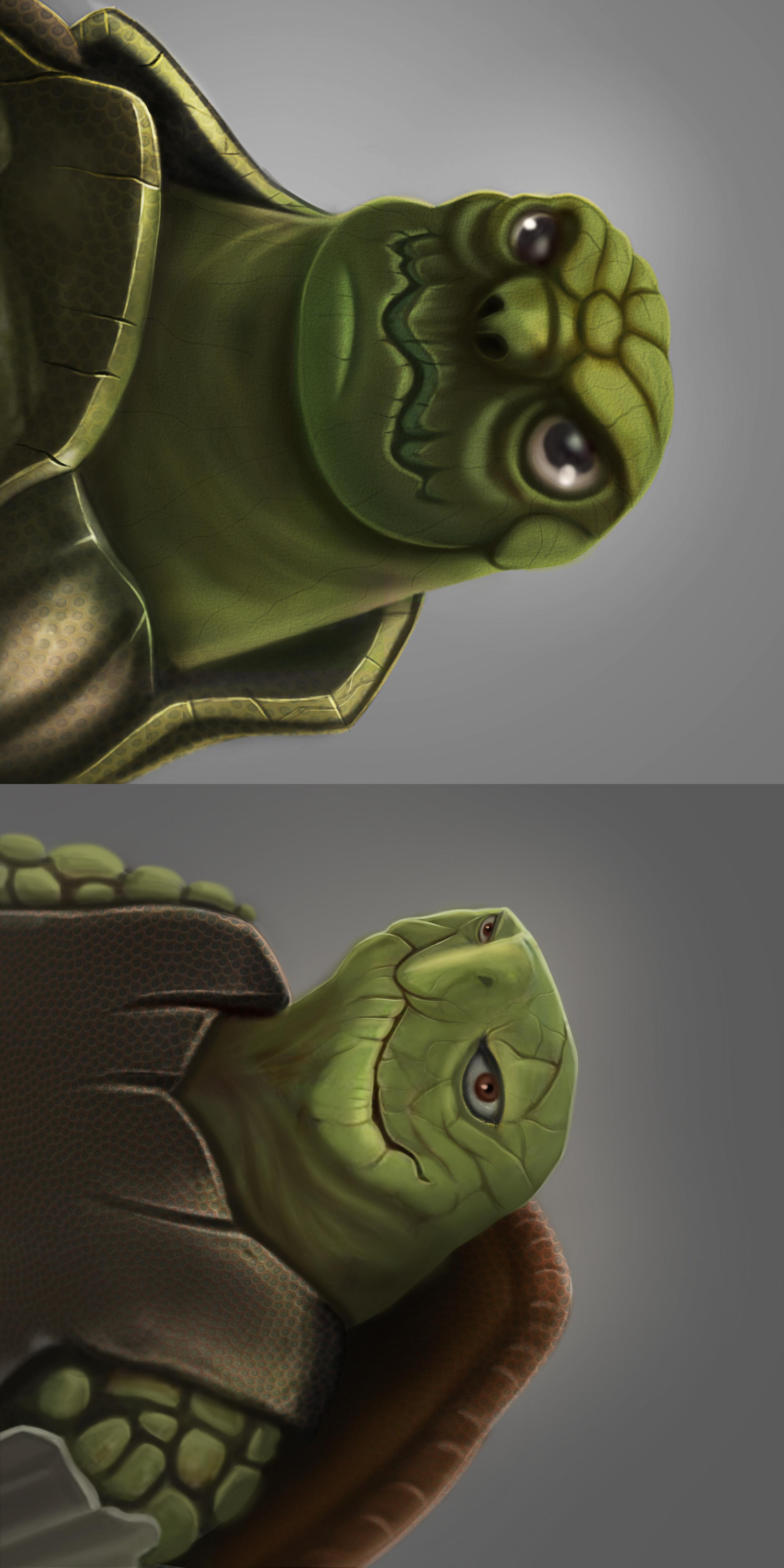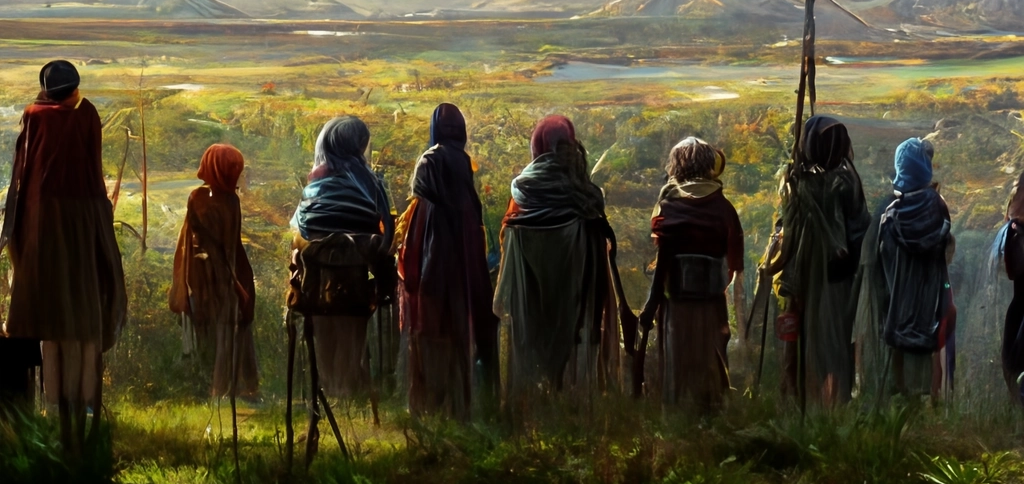Daraman People
The Daraman people are a Tortle ethnic group hailing from the Daraman rainforest on the continent of Felora. They are not particularly influential outside of their homeland, although they have reached many corners of the known world, perhaps more than any other. During the late Feloran Imperial Period, as Tabaxi-led Feloran expeditions became increasingly common, the loosely affiliated clans of the rainforest coalesced into a single group in order to effectively deal with the powerful Feloran Empire.
Daramans, as a result of their relative isolation in their rainforest homeland, have not spread in large numbers far from Daramar, and those that have often adopt the culture of their new home. Despite their isolation and nonexistent influence, until the last 30 years or so Daramans were some of the most well travelled peoples in the Known World, due to the longstanding tradition of the "World Pilgrimage", where a Daraman would leave their homeland for an indefinite amount of time to discover other cultures and ways of doing things. King Oréstund banned the pilgrimage in 413 PE.
Naming Traditions
Unisex names
Daraman names have no gender, and are generally a single word no more than 2 syllables.
Common names include: Abar, Dao, Nortle, Lun, Kwee, Mibosh, Opp, Sunny, Vabu, Zopa
Family names
Though family names have not been used by Daramans for sometime, a few are still in use. Generally, these are from the originator of a particularly powerful clan, who's chosen name is adopted and passed on to their hatchlings.
Notable clans include: Aro, Stund, and Uhok.
Other names
Daramans often change their name throughout their lives, often when having learned a new language or term from a faraway place. When they do this, their older name is often appended to the end.
Culture
Major language groups and dialects
The Daraman people within the Kingdom of Daramar almost exclusively speak the Daraman tongue. Due to their isolation and now paranoid King, few spend any time outside of their homeland. There are a few pockets of tortle communities in Leandris that speak the trade common, Feloran, and/or Aeillan, and those that migrated to the Independent Canal Settlements have adopted Feloran as a second language.
Shared customary codes and values
Daramans favor individualistic lifestyles and self-sufficiency. They believe that they carry their homes on their backs, though many do have permanent free-standing structures they reside in. Respect for one's regimented routine is considered a given, although less so in the younger generation that has only known the Mad King's rule.
Average technological level
Through sustained trade with the Empire of Felora and later their successor states, most Daramans in their home kingdom have adopted Feloran technologies such as plumbing and sewage systems in their cities and towns. There is familiarity with most of the world's most advanced inventions, including gunpowder, however, most Daramans do not have a working knowledge of more recent innovations. Magically, the Kingdom has more of its own domestic advancements. Daramans Clerics have a deep, almost Druidic, connection to the magic of the Daraman Rainforest, using it to enhance their natural abilities and commune with the spirits of the land. They are some of the most skilled "casters" in the known world.
Common Etiquette rules
It is expected that one listen before speaking, and in fact more value is placed on one's skill at listening than one one's skill at speaking. Interjecting during a conversation is often viewed as an indicator that one is not paying full attention to the other, and may be taken as a great insult. Daramans are not competitive, and trying to out-compete one another for the sake of competition or prowess alone is frowned upon.
Common Dress code
Daramans are unique for the ethnicities of the Known World for having no social compulsion to wear clothing of any kind. As tortles are naturally covered by their carapaces and plastrons, most tortles do not wear clothing in the common sense. Instead, ornamental accessories such as necklaces, hats, and sashes are worn by Daramans, with status often being demonstrated through expensive or exotic accessories.
Art & Architecture
Most Daraman homes are modest wooden structures made from the bountiful trees of the Daraman Rainforest. In more grassy areas, they are instead mound-like structures built from the mud and clay of the area. Larger buildings for religious, civic, military or administrative purpose are made from stone bricks mined from the Kingdom's surrounding mountains. These often are overtaken by the rainforest, and many Daraman buildings appear to be being slowly reclaimed by the jungle.
Common Customs, traditions and rituals
Daramans possess a deep understanding of the natural world; many use their knowledge to predict weather patterns and the best times for planting and harvesting.
Birth & Baptismal Rites
Newly hatched Daramans are kept in their nests by their parents for 2-5 years, learning all that their progenitors can tell before being considered youths and being turned loose into the world.
Coming of Age Rites
Daramans live in four main phases. Childhood, the shortest, lasts generally up to 5 years and is followed by
youthhood, which lasts anywhere between 20 to 40 years. Adulthood is the longest, and lasts for 30-50 years. When a Daraman adult settles to have children, they enter their final phase of life, Elderhood.
Traditionally, one's first World Pilgrimage marked the end of Youthhood (and the last one the end of Adulthood) and the beginning of the prime of a Daraman's life until the Mad King banned the practice. It is still undertaken in secret, however younger Daramans no longer undertake it to enter their mature years, and instead make a similar pilgrimage through the Kingdom, ending in Dara'ama.
Funerary and Memorial customs
Daramans prefer to die alone, as the affair is considered among the most intimate, too intimate even for loved ones. An elderly Daraman bequeaths all physical belongings to friends and family, tells all their remaining wisdom to their offspring, and makes arrangements for the disposal of their body when the time comes. In the case of an unexpected death, the partner or immediate offspring acts as the dying Daraman, carring out the death rites in the deceased's name.
Common Myths and Legends
Most Daramans believe that the sun and moon watch over them and other creatures, that each is the "eye" of the day and night, respectively. Many Daramans believe that evil curses will turn them into turtles, and that it is a form of divine punishment.
Major organizations
The Kingdom of Daramar is the chief Daraman institution, with a majority of Daramans still living within it's frontiers. Daramans do not have a cohesive organised religion, and autonomous temples throughout the Kingdom supporting local folk traditions and most Daramans incorporate aspects of foreign beliefs like Ashvetism, Pandroi, and Ëlhyaea.

Daraman Tortles by Lekshmi Bose
Encompassed species
Related Organizations
Related Locations
If as a Tortle using the Standard Tortle statblock:
- Put a +2 in Constitution, and a +1 in Wisdom
- Take proficiency in Perception


